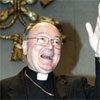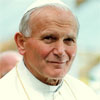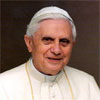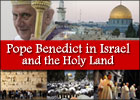Now as an Israeli (and it would be the same for the citizen of any other Nation), it never displeases me to see that there are those who look at my Nation with sympathy, who wish to understand its reasons, and who are determined to comprehend even the most difficult and controversial choices of its government. And as a human being, first and foremost, it can never displease me that there are those who feel deeply for the unending sufferings of a helpless civilian population, which is even otherwise sorely tried. But as a Catholic, as a Priest, it offends me that there are those who abuse this as an occasion to attack the Church. It displeases me very much that that there are still any who obstinately refuse to recognise that the Church in general, and the Holy See in particular, do not participate, and by their nature cannot participate, in political debate, do not take sides in temporal disputes, cannot and must not do it, and that in the end it is in the interest of everybody that they do not; that there are those who decline to acknowledge that the Holy See is not simply one more voice in the often cacophonous chorus of international actors.
The Church speaks on a completely different plane. She has a completely different mission. The Church never supports one Nation against another, and never acts as arbitrator, except when invited to do so by all the parties concerned. The Church promotes solely the exigencies of humanity and gives voice to mercy, to divine and human pity, to that righteousness that love alone fulfils. If there are circumstances in which political communities, acting within the specific logic of this-worldly power-relationships, judge that they cannot avoid the recourse to force, the Church cannot be there to bless their arms. This was recognised by Benedict XV well before being confirmed by Benedict XVI.
The persistence of the Holy See in discouraging and deploring always, everywhere and in whatever circumstances, the recourse to violence, and in promoting “in season and out of season” the sole ways of peaceful dialogue, cannot be reduced to the level of the disagreements among actors on the international scene, but must be seen as the pure expression of its own mission in representation of a “Kingdom that is not of this world. To read these expressions of that which is specific to the Church as if they were simple political partisanship, or the fruit of cold diplomatic calculations, or else ostentation of some “pacifist ideology” (in opposition to other political-military doctrines), means not knowing who and what the Church is. And when those who do so are cultured persons, who should be able to know better and understand more, this kind of attitude causes much wonderment, indeed perplexity and sadness.
Let all of these critics pause for a moment and think, and let them then admit that if the Church of Christ were to abandon this her high mission, and were to lower herself to the level of just another participant in the quarrel – albeit on the side that they believe to be in the right – our world would thereby be made frighteningly and dangerously the poorer.
 Personally, I can respect the Vatican's position as described by Fr. Jaeger. I would also add that this position as explicated in this essay seems to be fully embodied in the words and actions of Pope Benedict XVI.
Personally, I can respect the Vatican's position as described by Fr. Jaeger. I would also add that this position as explicated in this essay seems to be fully embodied in the words and actions of Pope Benedict XVI. Less so, or perhaps not at all, in Cardinal Martino, who -- in keeping with a remarkable penchant for provoking repeated controversy with the most ridiculous of remarks -- likened the situation in Gaza to "a concentration camp".
According to the New York Times, The Vatican sought to distance itself from Martino's remarks:
The Vatican spokesman, Rev. Federico Lombardi, called Cardinal Martino’s choice of words “inopportune,” and said they created “irritation and confusion” more than illumination.While calling the cardinal “an authoritative person,” Rev. Lombardi added that “The more authoritative voice and line would be that of the pope.”









0 comments:
Post a Comment